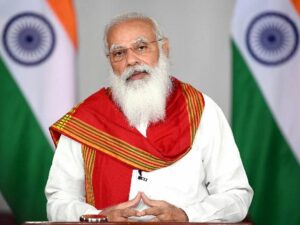by Kaustubh Kumar and Ashutosh Anand 7 June 2021
The COVID-19 pandemic has severely gripped the world in a catastrophe since the initial months of 2020, and there seems no near respite. As of June 5, more than 3.44 lakh people have perished due to COVID-19. Many have lost their close ones, and many children have become orphans.
As per the report submitted by the National Commission for Protection of Child Rights (NCPCR) in the Supreme Court of India, 1,742 children have lost both of their parents, 7,464 have lost one of their parents, and 140 children have been abandoned between March 2020 and May 29, 2021. The absence of parents makes the children vulnerable to child trafficking, child labour, and various other heinous crimes.
Recently, the Government of India, is a significant ‘welfare’ step, announced that children who lost both their parents or surviving parent or legal guardian/adoptive parents due to COVID-19 would be given support under the ‘PM CARES for Children’ Scheme.
As per the scheme, the children would receive a monthly stipend after 18 years of age and a fund of 10 lakh after 23 years of age from the Indian government to take care of the children’s higher education and personal requirements. For children below ten years, the government stated that the child would be admitted to the nearest ‘Kendriya Vidyalaya’ or a private school as a day scholar. If admitted to private schools, the government would bear the cost of the child. Moreover, the government stated that it would also bear the expenses of uniforms, textbooks, and stationery.
For children between 11 to 18 years of age, the government said they would be given admission to any residential government school. However, if the child is under the care of guardians/grandparents/other family members, they would be admitted to ‘Kendriya Vidyalaya’ or any private schools as a day scholar at the government’s expense.
The government also laid down a few provisions under the scheme to facilitate the child in obtaining an educational loan or any other assistance for higher education. The scheme also states that all the children would enroll in Ayushman Bharat Yojana and receive a health insurance cover of five lakh rupees. Various states like Uttar Pradesh and Madhya Pradesh have also formulated such schemes to benefit helpless children.
Furthermore, on June 3, the Central government came out with the guidelines for the states, identifying the responsibilities of states, district magistrates (DMs), police, Panchayati Raj institutions, and urban local bodies. One of the guidelines was that the states are directed to establish a local helpline number staffed by professionals to provide psychological treatment or assistance to children in distress, build a database of those children, and guarantee that the data is transferred to the Track Child site.
The government has done a commendable job in formulating such a policy to assist and facilitate the children in the education and health sector. However, there are a few concerns that might arise in the implementation of this policy. The blog aims to put them forth and further provides a few solutions for the same.
CHALLENGES FOR THE GOVERNMENT
These protections and entitlements will be provided to the children who became orphans due to the pandemic. The primary challenge for the children would be to prove that their parents lost their lives due to COVID-19. This would be a challenging task as there are possibilities and speculations of unreported deaths across the country. After they prove the above condition, they will be subjected to an endless list of paperwork, which would further hinder the policy’s implementation.
Moreover, the children residing in remote areas or forests might not benefit from various complexities such as lack of education, incognisance of policy, et al. Children with disabilities are also vulnerable to abuse, stigmatisation, and neglect, which further aggravates their suffering. Such children might probably get discriminated against or abused by the officials or authorities, which would leave them in a disadvantageous position.
When no one claims the kids, authorities put them in institutionalised care and make the youngsters available for adoption with the consent of relatives. Children welfare authorities should emphasise keeping the child with extended family as far as appropriate and safe, and institutional care should be used only as a last measure. Activists argue that children living in Child Care Institutions (CCIs), generally known as orphanages, are frequently overlooked when it comes to government funds, assistance, and development programs.
There is also fear that the government is establishing a new class of orphans by offering a financial package that is only accessible to children who have been affected by the pandemic. However, it should be noted that we cannot assert that children who become orphans as a result of COVID-19 are more susceptible than any other kid who got orphaned owing to a different reason.
RECOMMENDATIONS AND CONCLUSION
Due to their grave personal loss, many children would be under serious stress. Therefore, the steps taken by the authorities to initiate counselling the children to alleviate their trauma and grief is a welcome step.
Although, a mass chunk of people do not even know the schemes and guidelines issued. The government will have to raise awareness about such welfare steps through different media platforms so that each child gets an equal opportunity to avail of the offered benefits.
The government or state authorities should create a dedicated team of para-volunteers in every district, which may be entrusted with collecting data of such children, work to bridge the gap between children and authorities, and facilitate them in paperwork and other issues. The government has to develop concrete and effective solutions to resolve these issues and nurture the affected children in a true sense.

